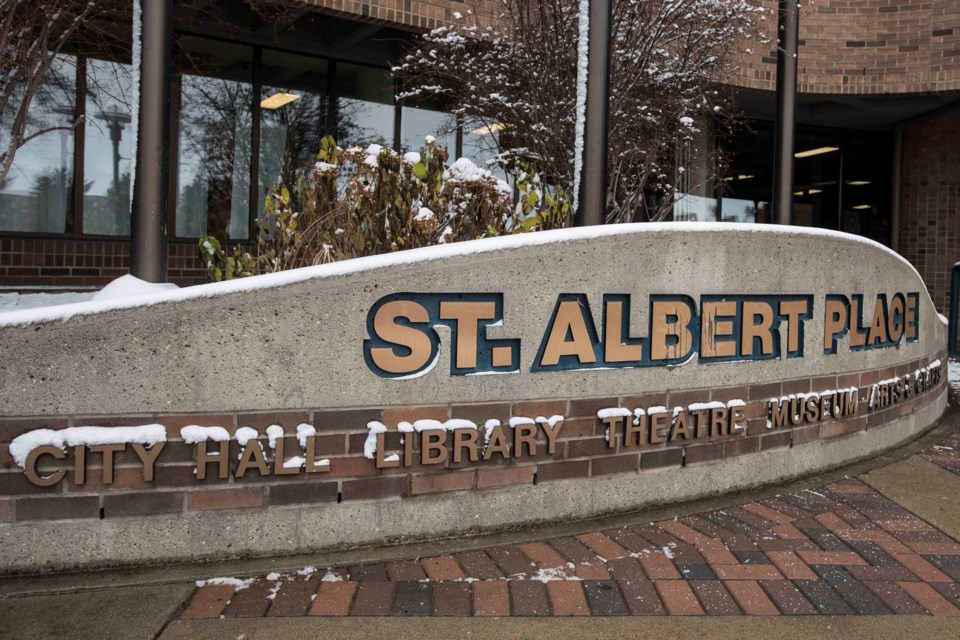A typical homeowner in St. Albert with a single-family home worth $450,000 will pay an extra $105 in property taxes this year, council heard Monday.
City council officially approved St. Albert’s 2022 budget, which includes a 2.8-per-cent tax increase, during the Dec. 20 meeting. The increase includes the minimum 1.5 per cent required to fund the city’s repair, maintenance, and replacement (RMR) infrastructure deficit. The $117-million budget includes $23.4 million for 29 RMR capital projects.
Utility rates will increase 4.5 per cent, adding $5.97 to the typical household’s monthly bill. The budget’s utility capital projects total $16.6 million.
Diane McMordie, St. Albert’s director of finance, told The Gazette the city had “pulled almost every stop” available this year to decrease residential taxes after the budget was first released in November.
This included applying $2.5 million from the city’s one-time COVID-19 relief funding to the tax base; reducing the assessment growth transfer (unused money put aside to expand operational costs in previous years); and the corporate learning budget (money to fund staff training and development).
The $220,000 that would normally go to the public art reserve transfer — money put aside each year to purchase and maintain public art — will also be applied to the tax base.
When presenting the budget on Nov. 2, chief administrative officer Kevin Scoble described the year as particularly difficult, noting external factors, including a reduction in capital grant funding, and inflationary costs which led administration to implement the above one-time cost-saving measures.
Council adds services
During council deliberation, council slightly scaled back other cost-saving measures, for example bringing $1.3 million in savings from service-level reductions down to roughly $1.09 million. Some service levels council voted to maintain include annual flower planting, casual staffing at rinks, and public portable toilets at outdoor recreation facilities.
On the utility capital side of the budget, council voted during deliberation to keep money on the table for a waste-to-energy pilot that hasn't gotten off the ground since it was approved in 2019. Instead, money will remain set aside should regional partners express interest in the near future.
Council also struck down a motion from Coun. Sheena Hughes to remove $26.1 million dedicated to the city's solar-farm project from the 2022 budget. The motion would have reduced the project's budget to $135,000, the price of ongoing pre-construction work.
In addition to adding services, council voted to add five municipal business cases totalling $774,500. These business cases include two full-time equivalent positions: one municipal energy specialist, and one Indigenous program coordinator. Administration had initially proposed all $1.2 million in new assessment growth — the pool of money used for these business cases and others — be put toward the tax base.
Another business case funded during deliberation will put $102,000 toward the implementation of cost-saving initiatives found in the city’s 2019 procurement audit by MNP. The funding will also be put toward implementing financial services recommendations from the more recent Ernst and Young operational and fiscal review.
Council also voted to put $325,000 toward community engagement on city names for infrastructure such as roads, as well as a policy change on how the city names future infrastructure.
Coun. Wes Brodhead, who began his fourth term as councillor this fall and has now participated in 12 budgets, said he feels this year's process "went well."
"It was a tight budget right from the get-go, and I thought administration put forward a reasonable path forward in a year of continuing COVID-19 experience," Brodhead said.
While watching for tax increases is an important part of council's job, Brodhead said council is also working to avoid "eroding the very factors that make St. Albert great" by ensuring service levels remain.
"There's a reason why St. Albert has the reputation it has for being an upscale wonderful community that people want to come to," Brodhead said. "The nice-to-haves were added back in, but those are things people are proud of. You drive through St. Albert and you see flowers on the corner, and you say you feel good about your community."
Though council voted to reinstate some services, Brodhead argued opportunities for deviation were more limited in terms of capital projects.
"The plan is established based on what our capital program needs are ... to adjust it by a year, personally, I don't believe that sets us up for success," Brodhead said.
During the budget process, a motion put forward by Coun. Shelley Biermanski to postpone a $5-million expansion to police services building accommodations failed 6-1.
Biermanski — elected this fall and new to the budget process as of this year — said she put forward motions to keep the tax increase lower. For example, a motion to reduce the arts and heritage operating funding by $92,860 failed 6-1. She noted, however, she is happy with the service levels council agreed on.
"Some of the services that were initially removed didn't make sense to me, because they were services that everyone would want," Biermanski said.
When asked how the budget process set the tone for council going forward, Biermanski noted there was collaboration, and also good debate.
"Everybody has their opinion," Biermanski said. "We're there to try and settle between us, and sometimes you can't win everyone."
Ultimately, she said she is trying to represent St. Albertans in a way that reflects what she hears from them.
"That's all I can do," Biermanski said.




